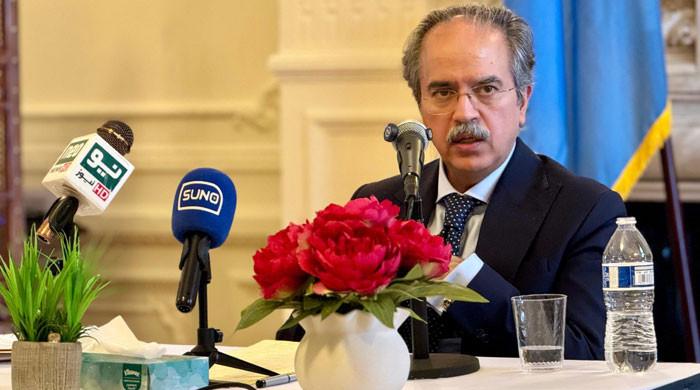Pakistan’s permanent representative to the United Nations, Ambassador Asim Iftikhar, said that Islamabad had serious reservations of his rival following the Pahalgam incident, which has been serious threats to the region’s peace and security.
The cashmere dispute is not resolved today, even after more than 70 years, said the envoy during the media information following the camera session of the United Nations Security Council (USC), which was summoned to the request of Pakistan in the midst of the tensions of Eindia after the Indian attack, illegally occupied Jammu and Kashmir (iiojk).
“The cashmere dispute is the central problem between Pakistan and India and it must be solved online with the aspirations of the Kashmir people,” he noted.
A peaceful solution to the cashmere dispute is not possible without the involvement of the cashmere people, he said. He also pointed out that lasting peace in the region was not possible without solving this basic problem.
Attating the attention of the world to the situation of human rights in Iiojk, he said that innocent civilians continue to face oppression and atrocities in the hands of Indian forces.
Islamabad said on several occasions and said once again that it has nothing to do with Pahalgam’s incident, he said, noting that Pakistan is ready to offer complete cooperation in an independent, transparent and international survey.
The ambassador reminded the international community that Pakistan had been the leading state in the global fight against terrorism and sacrificed more than 90,000 lives in this fight.
The Iftikhar ambassador reiterated the firm commitment of Pakistan to defend its sovereignty and its territorial integrity. “Pakistan has the right to defend itself,” he observed.
The envoy of Pakistan to the United Nations expressed strong concerns concerning the decision of India to suspend the Industry Water Treaty, describing it as a violation of international law. He noted that the case had also been raised during the CSNU meeting.
He reiterated that it was essential to act on Security Council resolutions for lasting peace in the region.
Iftikhar said Pakistan prefers dialogue to solve all problems with its neighbors, because dialogues are the only viable path to peace.
He thanked the Security Council for summoning the meeting, which, according to him, aimed to discuss the current situation.
At the start of the Security Council session, Khaled Khiari, UN deputy secretary general for the Middle East, Asia, and the Pacific informed the Member States, according to diplomats.
Later, ambassador Iftikhar highlighted the question.
Before the meeting of the organization of 15 members, the Secretary General of the United Nations, Antonio Guterres, called for a “maximum restraint” of India and Pakistan, warning that the climbing of tensions on a recent murderous terrorist attack in cashmere may shirk a pure military confrontation.
Addressing journalists outside the Security Council, Guterres has expressed deep concern about the deterioration of relations between the two neighbors in South Asia, saying that they had reached “their highest for years”.
He reiterated his condemnation of the terrorist attack on April 22 in the Pahalgam region, which killed at least 26 civilians and injured much more.
“The targeting of civilians is unacceptable – and those responsible must be brought to justice by credible and legal means,” said the UN chief.
“It is also essential – especially at this critical hour – to avoid a military confrontation which could easily become out of control.”




